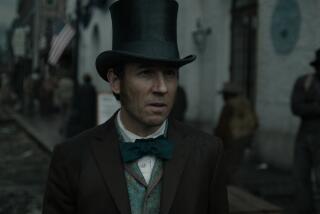COLUMN RIGHT/ ROBERT K. DORNAN : Letters Take the Measure of Two Men : Rhodes scholar Clinton is separated from a Rhode Island officer at Manassas by far more than time and eloquence.
- Share via
A couple of years ago, Americans sat transfixed before the remarkable documentary on the Civil War produced by Ken Burns. It was the most watched program in the history of public broadcasting and set new standards of excellence.
Perhaps the most moving and memorable scene occurred at the end of the first episode, during the reading of a letter written by Maj. Sullivan Ballou of the 2nd Rhode Island to his wife Sarah on July 14, 1861. This was a week before the battle of Manassas in which Ballou, to use Lincoln’s phrase, “gave the full measure of devotion.” I have yet to meet anyone who did not have tears in their eyes after hearing Ballou’s beautiful and timeless words.
I thought it might prove enlightening to compare the feelings and attitudes found in Ballou’s letter to those found in the wartime letter penned by Bill Clinton on Dec. 3, 1969, concerning his being drafted into the military. By that time, Clinton had used repeated political influence to avoid the draft and had organized anti-war demonstrations on foreign soil. It is these events during the fall and winter of 1969 that make his companionless trip to Moscow and Prague during the first weeks of 1970 so suspect.
On dying for their country:
Clinton: “Because of my opposition to the draft and the war, I am in great sympathy with those who are not willing to fight, kill and maybe die for their country.”
Ballou: “I know how . . . great a debt we owe to those who went before us through the blood and sufferings of the Revolution. And I am willing--perfectly willing--to lay down all my joys . . . to pay that debt.”
On their future:
Clinton: “For years I have worked to prepare myself for a political life characterized by both practical political ability and concern for rapid social progress. It is a life I still feel compelled to try to lead.”
Ballou: “The memories of the blissful moments I have spent with you come creeping over me, and I feel most gratified to God and to you that I have enjoyed them so long. And hard it is for me to give them up and burn to ashes the hopes of future years when, God willing, we might still have lived and loved together, and seen our sons grown up to honorable manhood.”
On sacrifice:
Clinton: “The decision not to be a resister and the related subsequent decisions were the most difficult of my life. I decided to accept the draft in spite of my beliefs for one reason: To maintain my political viability within the system.”
Ballou: “Sarah, my love for you is deathless, it seems to bind me with mighty cables that nothing but Omnipotence could break, and yet my love of country comes over me like a strong wind and bears me unresistably on with all these chains to the battle field.”
On agony:
Clinton: “At that time, after we had made our agreement and you had sent my 1-D deferment to my draft board, the anguish and loss of my self-regard and self-confidence really set in. I hardly slept for weeks and kept going by eating compulsively and reading until exhaustion brought sleep. Finally, on Sept. 12, I stayed up all night writing a letter to the chairman of my draft board.”
Ballou: “I have, I know, but few and small claims upon Divine Providence, but something whispers to me--perhaps it is the wafted prayer of my little Edgar--that I shall return to my loved ones unharmed. If I do not, my dear Sarah, never forget how much I love you, and when my last breath escapes me on the battlefield, it will whisper your name. Forgive my many faults, and the many pains I have caused you. How thoughtless and foolish I have oftentimes been! How gladly would I wash out with my tears every little spot upon your happiness.”
When you compare the two, it is astonishing that so many commentators found Clinton’s mawkish letter “thoughtful” and “tormented.” And I often wonder how Ballou--who went into battle with teen-agers--would have reacted to Clinton’s excuse that he was just a 23-year-old “boy” at the time.
But more to the point. Whereas Ballou’s definition of success is raising “honorable” men, Clinton’s is a career in politics. Whereas Ballou found the call of his country to be more powerful than even his “deathless” love for his wife, Clinton found the call of his country couldn’t match the love he had for . . . himself.
Clearly there is more than just a century that separates these two men.
More to Read
The complete guide to home viewing
Get Screen Gab for everything about the TV shows and streaming movies everyone’s talking about.
You may occasionally receive promotional content from the Los Angeles Times.






